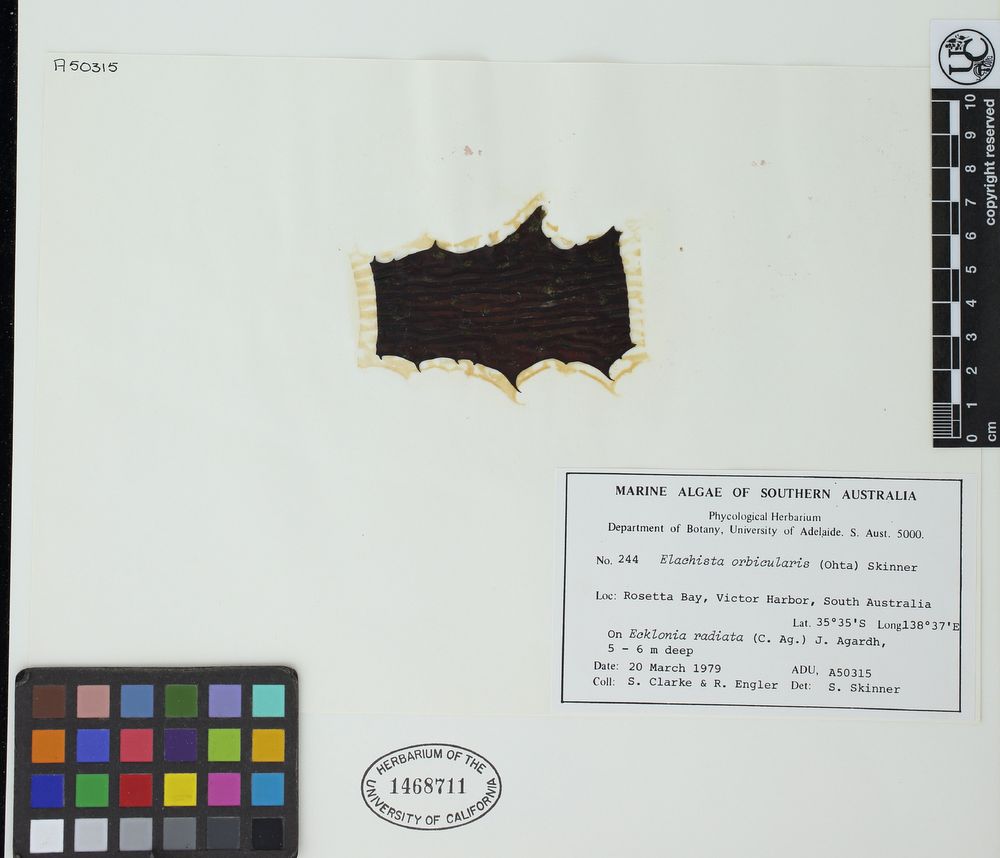Invasion History
First Non-native North American Tidal Record: 1984First Non-native West Coast Tidal Record: 1984
First Non-native East/Gulf Coast Tidal Record:
General Invasion History:
Elachista nigra was first described from Aomori Prefecture, Honshu, Japan, and is known from the east, west, and south coasts of Japan to the south coast of South Korea (Uwai et al. 2002; Lee 2000, Lee & Kang 2001, cited by Guiry and Guiry 2016). In Japan, E. nigra is known to grow on the kelps Eisenia bicyclis, Ecklonia stolonifera, Ecklonia kurome, Laminaria japonica and Undaria pinnatifera (Skinner 1983; Uwai et al. 2002; Kitayama et al. 2005). In 1984, E. nigra was collected on the native kelp Eisenia arborea on San Clemente Island, in the Channel Islands of California (Kitayama et al. 2005; Miller et al. 2011). It is also known from New South Wales, South Australia, and West Australia (Skinner 1983; Womersley 1987, cited by Guiry and Guiry 2016).
North American Invasion History:
Invasion History on the West Coast:
During a study of seaweed epiphytes, Elachista nigra was discovered on dried herbarium specimens of the native kelp Eisenia arborea from Wilson's Cove on San Clemente Island, in the Channel Islands of California, collected in 1984 (Kitayama et al. 2005; Miller et al. 2011). Since no introduced kelps were known from California at that time, and few Pacific Oyster plantings were made in Southern California, the mechanism of introduction is unclear.
Invasion History Elsewhere in the World:
In 1976-1980, Elachista nigra was collected at several sites near Adelaide, South Australia, on the native kelp Ecklonia radiata. It was later found on Rottnest Island, Western Australia in 1979, and Garie Beach, New South Wales in 1983. It is considered a probable introduction to Australia (Womersley 1987). As in California, it was not associated with an introduced kelp, and arrived decades before the discovery of the Japanese kelp Undaria pinnatifida in Australia.
Description
Elachista nigra grows on kelp species, including the genera Eisenia, Ecklonia, Laminaria, and Undaria. Its thallus consists of a hemispherical cushion, consisting of basal porstrate filaments, bearing smaller erect filaments. The thallae are attached to the kelp surface by peg-shaped protrusions from the porstrate filaments which extend from the cushion. The filaments have a constricted base and a tapering tip. The filaments are 5-10 µm in diameter and may reach 0.5-4.0 mm long. In older thalli, the filaments are dichotomously branched. The colorless filaments develop into unilocular sporangia, a unicellular string of spore-producing cells. The thalli have the appearance of small-fuzzy patches on the blade of the kelp. This description is based on Skinner 1983, Uwai et al. 2002, and Kitayama et al. 2005.
Taxonomy
Taxonomic Tree
| Kingdom: | Plantae | |
| Phylum: | Phaeophycophyta | |
| Class: | Phaeophyceae | |
| Order: | Ectocarpales | |
| Family: | Elachistaceae | |
| Genus: | Elachista | |
| Species: | nigra |
Synonyms
Goniada orbicularis (Wormersley, 1987)
Elachista nigra (None, None)
Potentially Misidentified Species
Ecology
General:
Elachista nigra grows on kelps of the genera Eisenia, Ecklonia, Laminaria, and Undaria (Skinner 1983; Uwai et al. 2002; Kitayama et al. 2005). Development is presumed to be direct, with fused gametes developing into colonies similar to the parent form (Womersley 1987). However, in the congener Elachista fucicola, life history and reproductive mode depends on environmental conditions, including temperature, salinity, and light and the plant can grow either as a diploid 'macrothallus', producing plurispores, or a haploid 'microthallus'. When subjected to warmer temperatures and longer daylengths, the microthalli bud off diploid macrothalli (Bold and Wynne 1978). It is not known whether E. nigra has the same type of environmentally-induced heteromorphic life-cycle.
Little is known of the environmental requirements and ecology of Elachista nigra. Its environmental tolerances are presumably similar to those of its host kelps. The extent to which E. nigra affects its host plant or is grazed by invertebrates is unknown.
Trophic Status:
Primary Producer
PrimProdHabitats
| General Habitat | Rocky | None |
| Salinity Range | Polyhaline | 18-30 PSU |
| Salinity Range | Euhaline | 30-40 PSU |
| Tidal Range | Subtidal | None |
| Vertical Habitat | Epibenthic | None |
Life History
Tolerances and Life History Parameters
| Maximum Length (mm) | 4 | Skinner 1983 |
| Broad Temperature Range | None | Cold temperate-Warm-temperate |
| Broad Salinity Range | None | Polyhaline-Euhaline |
General Impacts
There are no known economic or ecological impacts of Elachista nigra.
Regional Distribution Map
Non-native
Native
Cryptogenic
Failed
Occurrence Map

References
Bold, Harold C.; Wynne, Michael J. (1978) Introduction to the Algae: Structure and Reproduction, Prentice-Hall, Englewood Cliffs, NJ. Pp. <missing location>Guiry, M. D.; Guiry, G. M. 2004-2023 AlgaeBase. https://www.algaebase.org/
Kitayama, Taiju; Miller, Kathy Ann; Silva, Paul C. (2005) First record of Elachista nigra (Chordariales, Phaeophyta) from California, North America, Bulletin of the National Science Museum, Tokyo, Series B 31(2): 57-61
Miller, Kathy Ann; Aguilar-Rosas, Luis Ernesto; Pedroche, Francisco F. (2011) A review of non-native seaweeds from California, USA and Baja California, Mexico, Hidrobiológica 21(3): 365-379
Skinner, Stephen (1983) The life-history of Elachista orbicularis (Ohta) comb. nov. (Elachistaceae, Phaeophyta) in southern Australia, British Phycological Bulletin 18: 97-104
Uwai, Shinya; Kogame, Kazuhiro; Masuda, Michio (2002) Conspecificity of Elachista nigra and Elachista orbicularis (Elachistaceae, Phaeophyceae), Phycological Research 50: 217-225
Wiltshire, K.; Rowling, K.; Deveney, M. (2010) <missing title>, South Australian Research and Development Institute, Adelaide. Pp. 1-232
Womersley, H.B.S. (1987) <missing title>, Australian Government Printing Division, Adelaide. Pp. <missing location>
